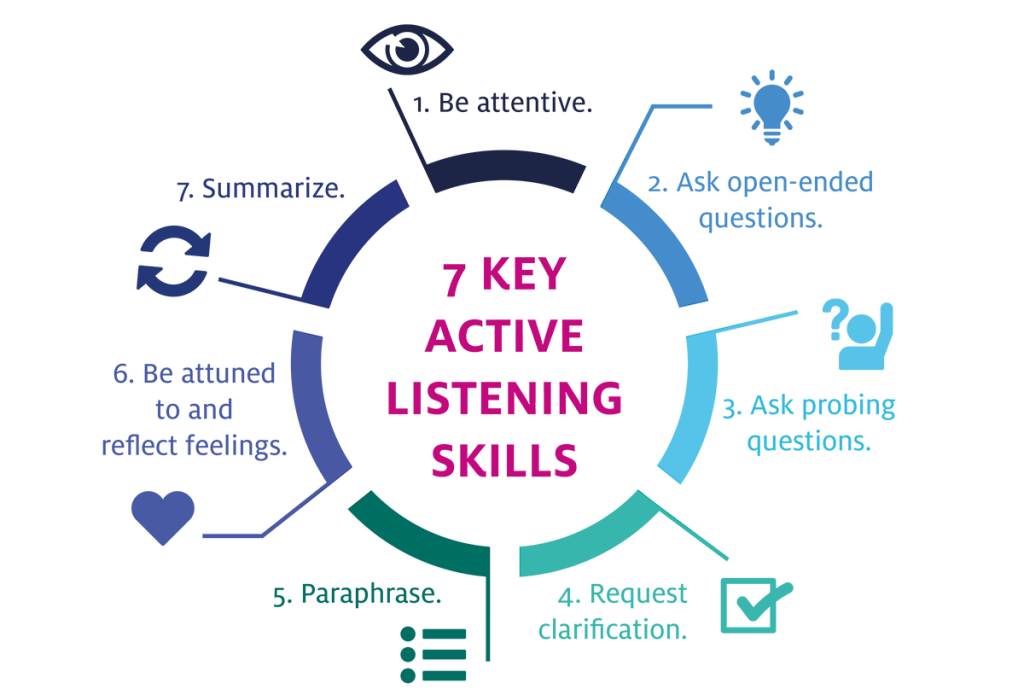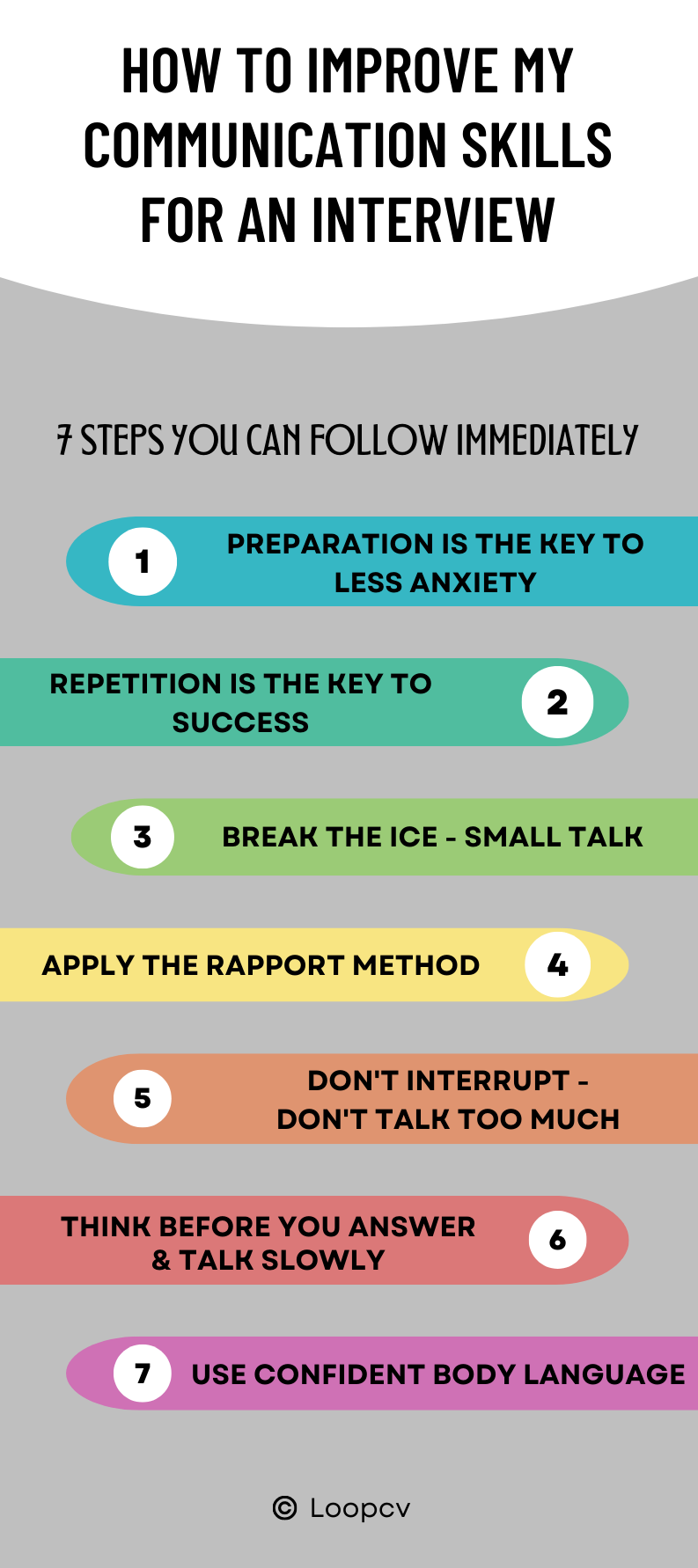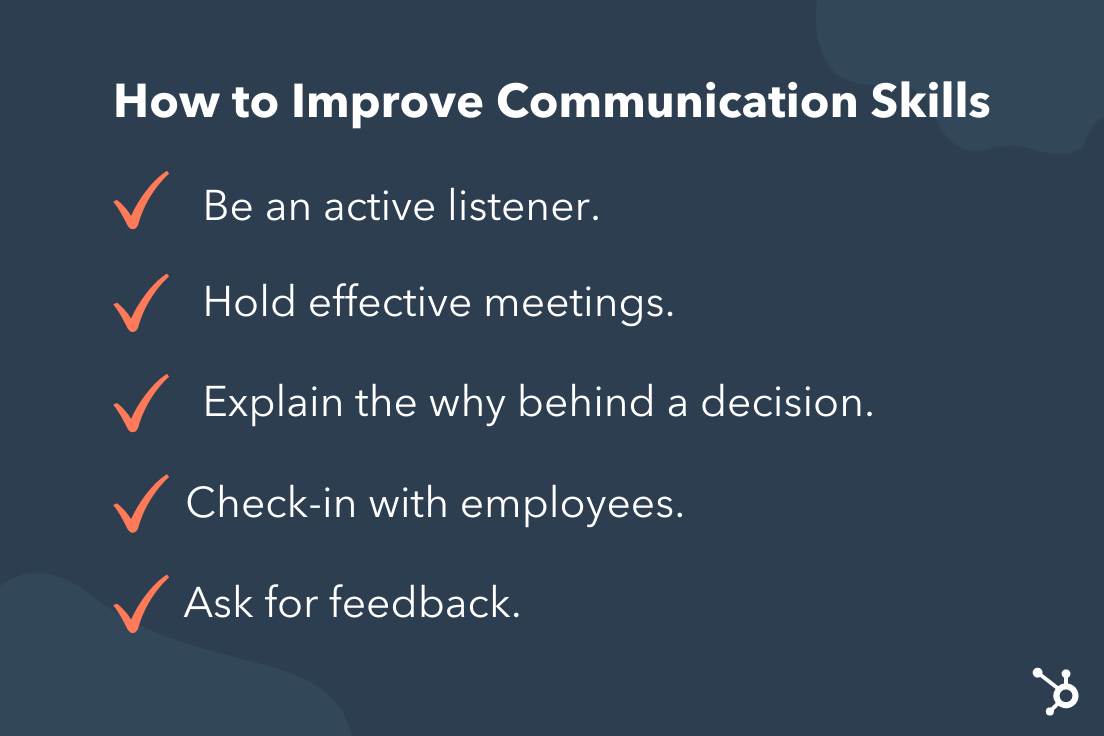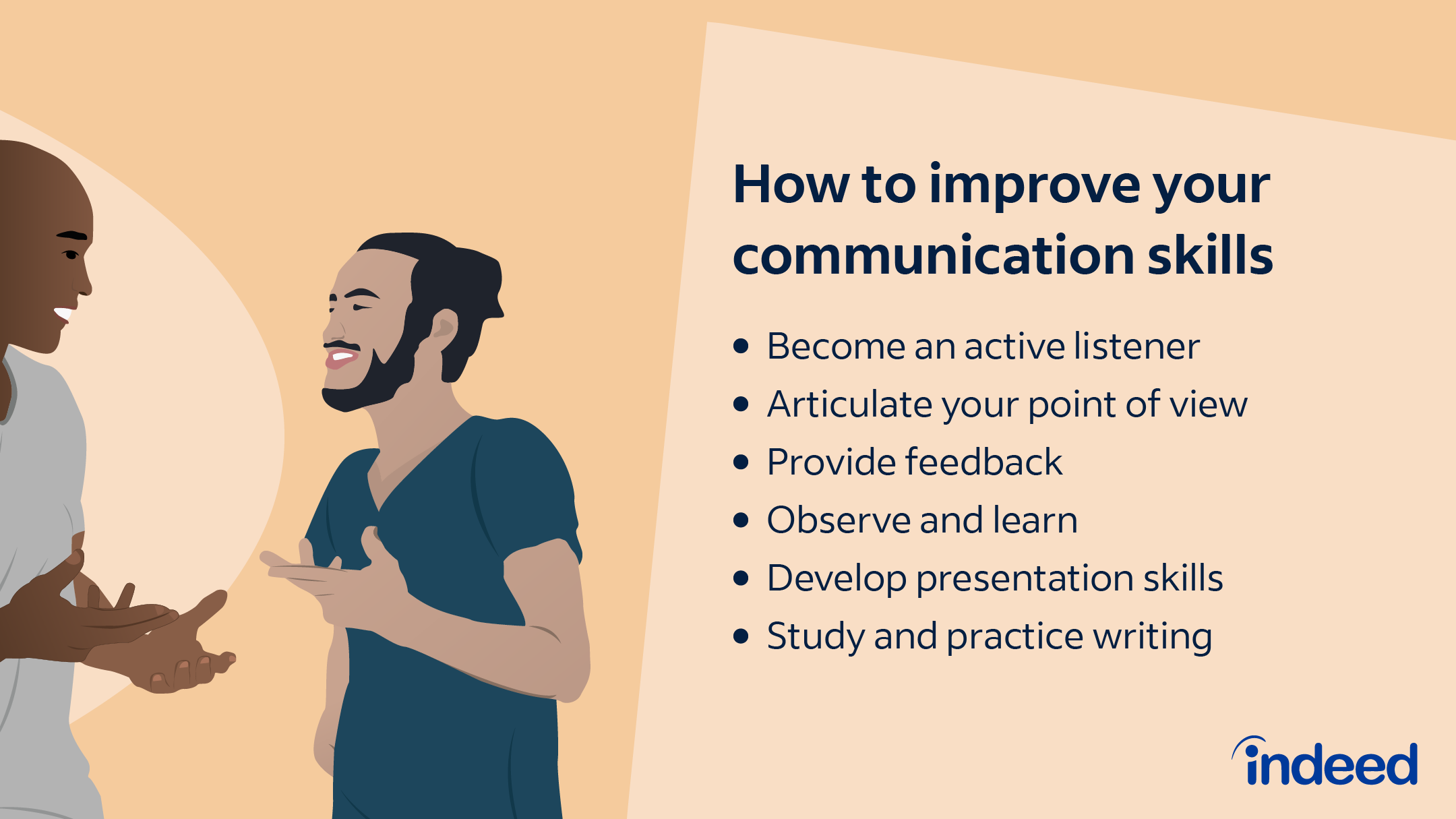To improve your communication skills, practice active listening and engage in regular reading and writing exercises. Enhancing your vocabulary and being aware of your body language also play crucial roles.
Effective communication is essential in every aspect of life, whether in personal relationships, professional settings, or casual interactions. Mastering this skill can lead to better teamwork, increased productivity, and stronger bonds with others. Many people struggle with communication, but by focusing on key areas such as listening, clarity in speech, and non-verbal cues, anyone can become an effective communicator.
Regular practice and constructive feedback are critical. Engaging in conversations with diverse groups can also expand your understanding and adaptability, making you a more competent communicator. Emphasizing these strategies can dramatically improve how you connect and interact with others.
Introduction To Effective Communication
Introduction to Effective Communication
Effective communication is the bedrock of strong relationships, both personally and professionally. It involves more than just speaking clearly or finding the right choice of words. Understanding the nuances of body language, tone, and active listening skills can transform interactions, leading to better outcomes. This section sheds light on how to enhance these skills, ensuring that messages are not just heard but truly understood.
The Importance of Communication
The Importance Of Communication
Good communication is crucial. It builds trust and fosters connections. It is the thread that ties teams, friends, and families together. Without it, misunderstandings occur, leading to conflict and frustration. Effective communicators enjoy stronger relationships, achieve more in their careers, and navigate life’s challenges with greater ease.
Identifying Personal Communication Goals
Identifying Personal Communication Goals
- Set clear targets: What do you want to achieve?
- Analyze strengths and weaknesses: What are you good at? What needs work?
- Seek feedback: What do others think about your communication style?
- Create an action plan: How will you improve?
Setting personal goals for communication helps focus efforts. It turns vague aspirations into concrete plans. Whether it’s improving public speaking, mastering the art of persuasion, or just being a better listener, clear goals are the first step to success.
Active Listening: A Key Component
Improving communication skills can transform relationships and career prospects. Active listening stands out as a key component. It’s not just about hearing words. It’s about fully understanding the speaker’s message.
Principles Of Active Listening
Active listening involves several principles that ensure effective communication. By applying these, conversations become more meaningful.
- Focus: Give the speaker full attention. Avoid distractions.
- Body Language: Non-verbal cues show you are engaged.
- Feedback: Offer verbal nods or short phrases to show you’re tracking.
- Clarify: Ask questions if you’re unsure about the message.
- Summarize: Restate key points to confirm understanding.
Exercises To Enhance Listening Skills
Several exercises can boost your ability to listen actively. They make you a better communicator.
| Exercise | Description | Benefit |
|---|---|---|
| Mirroring | Repeat the speaker’s words mentally. | Increases retention and understanding. |
| Eye Contact | Maintain good eye contact without staring. | Shows respect and interest. |
| Paraphrasing | Restate the speaker’s message in your own words. | Confirms and solidifies your understanding. |
Practicing these exercises daily will sharpen your listening skills. Conversations will become richer. Connections will deepen. Opportunities will arise.
Articulating Thoughts Clearly
Articulating thoughts clearly is a vital skill for effective communication. It’s about expressing your ideas in a way others can easily understand. To do this, you need to structure your thoughts and speak with purpose. Let’s dive into how you can master this skill.
Structure Your Ideas
Organized thoughts make for clear communication. Before speaking, take a moment to outline your main points. This helps you stay on track and makes it easier for your audience to follow along. Think of it like building a house: lay a solid foundation, then add one idea at a time.
- Start with a key point: Begin with your main message.
- Add supporting details: Use facts or examples to back up your point.
- Wrap it up: End with a summary or a call to action.
Avoiding Ambiguity
Being clear means avoiding words that confuse. Choose words that leave no doubt about what you mean. This makes sure everyone gets the same message. Like a clear photo, your words should help others see your point without any fuzziness.
| Ambiguous Word/Phrase | Clear Alternative |
|---|---|
| Sort of | Specifically |
| Maybe | Definitely |
| Thing | The exact item you’re referring to |
Practice these strategies to make sure you’re understood. Clear communication opens doors to better relationships and opportunities.

Credit: www.ridrivingschool.com
Non-verbal Communication Cues
Mastering the art of conversation involves more than spoken words. Non-verbal communication cues play a crucial role. They can strengthen your message or betray your true feelings. Let’s dive into the silent signals that speak volumes.
Understanding Body Language
Body language is a silent orchestra of communication. Standing tall can signal confidence. Crossed arms might show defense. Align body language with words to ensure clarity and sincerity. Observe others to decode their silent messages.
The Role Of Eye Contact
Eye contact is a powerful tool. It builds trust and shows interest. Too much can intimidate. Too little can signal disinterest. Find a balance. Aim for a steady but soft gaze that feels comfortable for both parties.
Facial Expressions And Gestures
Facial expressions reveal emotions without a single word. A smile can warm a heart; a frown can raise walls. Gestures add emphasis to your words. Use them to express ideas more vividly. But remember, subtle movements are often more effective than grand gestures.
- Smile to show friendliness.
- Nod to show understanding.
- Keep gestures open and inclusive.
Practice these non-verbal skills to enhance your communication. Pay attention to others’ cues. This will improve interactions and help forge stronger connections.
Emotional Intelligence In Communication
Improving communication skills involves understanding Emotional Intelligence (EI). It’s about how we recognize and handle our emotions and others’. This understanding improves how we convey and receive messages.
Empathy In Interactions
Empathy is crucial in effective communication. It helps us see things from others’ perspectives. This skill fosters deeper connections and trust. Here are ways to improve empathy:
- Listen actively to what others say without planning your response.
- Observe non-verbal cues to fully understand the speaker’s emotions.
- Ask questions to clarify and show you care about their feelings.
Managing Emotions
Managing your emotions helps in maintaining clarity and calmness during conversations. Here are tips to manage emotions effectively:
- Recognize your emotional state before responding in discussions.
- Take a moment to breathe if you feel overwhelmed or angry.
- Practice self-awareness to better understand your emotional triggers.
Feedback: Giving And Receiving
Mastering the art of feedback is crucial for improving communication skills. This involves both how we give and receive feedback. Understanding and applying feedback can transform how we interact and convey messages. Let’s dive into the essentials of handling feedback effectively.
Constructive Criticism
Giving feedback is an art. The goal is to help, not hurt. Follow these steps to master this art:
- Be clear and specific about what can improve.
- Focus on the action, not the person, to avoid sounding personal.
- Use a positive tone to encourage rather than discourage.
For example, instead of saying “You didn’t complete the task,” try “Let’s discuss how we can manage tasks more efficiently.”
Receptiveness To Feedback
Receiving feedback well is also key. Here’s how you can be more receptive:
- Listen actively, without interrupting.
- Ask questions for clarity.
- Thank you for the feedback and reflect on it.
This approach helps you grow and shows you value others’ input.
Adapting Communication Styles
Effective communication is a game-changer in personal and professional settings. Mastering the art of adapting communication styles is crucial for success. Let’s explore how to tailor your approach for better interactions.
Recognizing Different Styles
Understanding various communication styles is the first step. People communicate differently. Some prefer direct and concise messages, while others enjoy detailed and thoughtful conversations. Identifying these preferences allows for more meaningful exchanges.
- Assertive: Clear and confident without being aggressive.
- Aggressive: Forceful and sometimes overpowering.
- Passive: Hesitant and often yielding to others.
- Passive-Aggressive: Indirect resistance and avoidance of direct communication.
Flexibility And Appropriateness
Adapting to different styles means being flexible. Match your communication to the situation and the person you’re engaging with. It’s about finding the right balance.
| Style | When to Use |
|---|---|
| Assertive | When clear decisions are needed. |
| Aggressive | Best avoided; can be counterproductive. |
| Passive | When harmony is more important than your own needs. |
| Passive-Aggressive | Rarely effective; clarity is better. |
Remember, the goal is to connect, not to win. Watch for cues, listen actively, and be willing to adjust. This approach fosters understanding and respect.

Credit: blog.loopcv.pro
Continuous Improvement And Practice
Mastering communication skills is a journey that never ends. It’s about learning, growing, and practicing regularly. Strong communication opens doors in personal and professional worlds. To excel, one must embrace the art of continuous improvement and practice.
Learning From Experiences
Every conversation offers lessons. Reflect on past talks. What worked? What failed? It’s crucial to identify strengths and weaknesses. Keep a journal of your interactions. Note key takeaways. This will help you track your progress and focus on areas needing improvement.
Seeking Opportunities For Practice
Practice is the key to perfection. Seek out chances to communicate. Join groups, attend workshops, or practice with friends. Aim for diverse settings to challenge your adaptability. Role-play different scenarios. Feedback is a gift. Welcome it, learn from it, and apply it.
Below are actionable steps to incorporate practice into your routine:
- Join a club like Toastmasters to practice public speaking.
- Engage in conversation with people from different backgrounds.
- Volunteer for presentations at work or in your community.
- Practice active listening to understand and respond better.
- Record yourself to self-evaluate your communication style.
Utilizing Technology For Communication
Embracing the digital age transforms how we communicate. As we step into an era where screens dominate, mastering the art of digital dialogue is key. Let’s explore how technology can enhance our communication skills.
Digital Communication Tools
Emails, instant messaging, and video calls stand at the forefront of modern communication. These tools break barriers, allowing real-time collaboration across the globe. They are vital in today’s connected world.
- Email: Perfect for formal and detailed messages.
- Instant Messaging: Offers quick, informal chat.
- Video Calls: Mimic face-to-face interaction.
Each tool serves a purpose. Understanding when to use them is crucial.
Netiquette For Online Interactions
Rules of engagement change online. Netiquette shapes these interactions. It’s the etiquette we follow on the internet.
- Be concise: Keep messages clear and to the point.
- Respect privacy: Don’t share personal info.
- Stay professional: Maintain a polite tone.
Remember, behind every screen is a person. Treat them with kindness and respect.
Conclusion: Integrating Skills Into Daily Life
Mastering communication skills is a journey, not a destination. Day-to-day practice embeds these skills into your routine. Let’s explore how to make this commitment and create an action plan that sticks.
Long-term Commitment To Growth
Continuous improvement is key to becoming a better communicator. It’s about small, daily steps that lead to big changes over time. Think of it like watering a plant; regular care helps it thrive.
- Read every day to expand your vocabulary.
- Listen actively to how others express themselves.
- Practice speaking to boost your confidence.
Creating A Personal Action Plan
Set clear goals for your communication skills. Write them down to keep track. Think about what you want to achieve and how you’ll get there.
| Goal | Strategy | Timeline |
|---|---|---|
| Improve vocabulary | Learn a new word daily | 1 month |
| Enhance listening | Summarize conversations | 2 weeks |
| Boost confidence | Public speaking practice | 3 months |
Review your plan regularly and adjust as needed. Celebrate small wins to stay motivated. Turn these skills into habits, and watch your communication transform.

Credit: blog.hubspot.com
Frequently Asked Questions
What Is The Best Way To Improve Communication Skills?
To enhance communication skills, engage in active listening, practice public speaking, read widely, join communication workshops, and seek feedback on your interactions.
How Can Poor Communication Be Improved?
To improve poor communication, actively listen, encourage feedback, and clarify messages. Practice empathy, and use simple language. Regularly train teams in effective communication skills.
What Are 5 Good Communication Skills?
Effective communication hinges on five key skills: active listening, clear articulation, empathy, non-verbal cues awareness, and open-mindedness. These skills enhance mutual understanding and foster productive interactions.
What Are The 12 Ways To Improve Your Communication?
1. Practice active listening. 2. Maintain eye contact. 3. Use clear, concise language. 4. Enhance your non-verbal communication. 5. Provide feedback. 6. Be empathetic. 7. Adjust your communication style. 8. Read your audience. 9. Engage in public speaking. 10. Ask questions.
11. Develop your writing skills. 12. Stay positive.
Conclusion
Mastering communication skills is vital for personal and professional growth. By actively listening, practicing empathy, and honing clarity in expression, you can significantly enhance your interactions. Remember, the path to effective communication is a continuous journey, not a destination. Start implementing these strategies today and watch as your conversations transform and opportunities unfold.
{ “@context”: “https://schema.org”, “@type”: “FAQPage”, “mainEntity”: [ { “@type”: “Question”, “name”: “What is the best way to improve communication skills?”, “acceptedAnswer”: { “@type”: “Answer”, “text”: “To enhance communication skills, engage in active listening, practice public speaking, read widely, join communication workshops, and seek feedback on your interactions.” } } , { “@type”: “Question”, “name”: “How can poor communication be improved?”, “acceptedAnswer”: { “@type”: “Answer”, “text”: “To improve poor communication, actively listen, encourage feedback, and clarify messages. Practice empathy, and use simple language. Regularly train teams in effective communication skills.” } } , { “@type”: “Question”, “name”: “What are 5 good communication skills?”, “acceptedAnswer”: { “@type”: “Answer”, “text”: “Effective communication hinges on five key skills: active listening, clear articulation, empathy, non-verbal cues awareness, and open-mindedness. These skills enhance mutual understanding and foster productive interactions.” } } , { “@type”: “Question”, “name”: “What are the 12 ways to improve your communication?”, “acceptedAnswer”: { “@type”: “Answer”, “text”: “1. Practice active listening. 2. Maintain eye contact. 3. Use clear, concise language. 4. Enhance your non-verbal communication. 5. Provide feedback. 6. Be empathetic. 7. Adjust your communication style. 8. Read your audience. 9. Engage in public speaking. 10. Ask questions. 11. Develop your writing skills. 12. Stay positive.” } } ] }